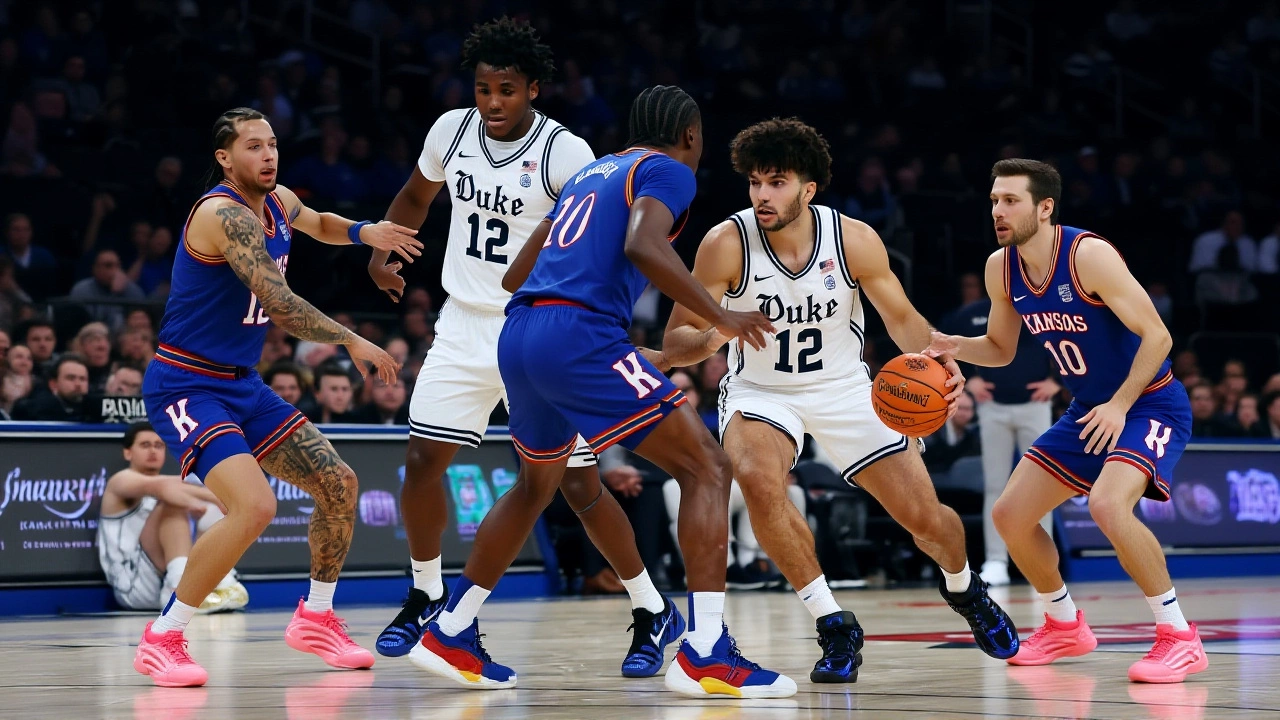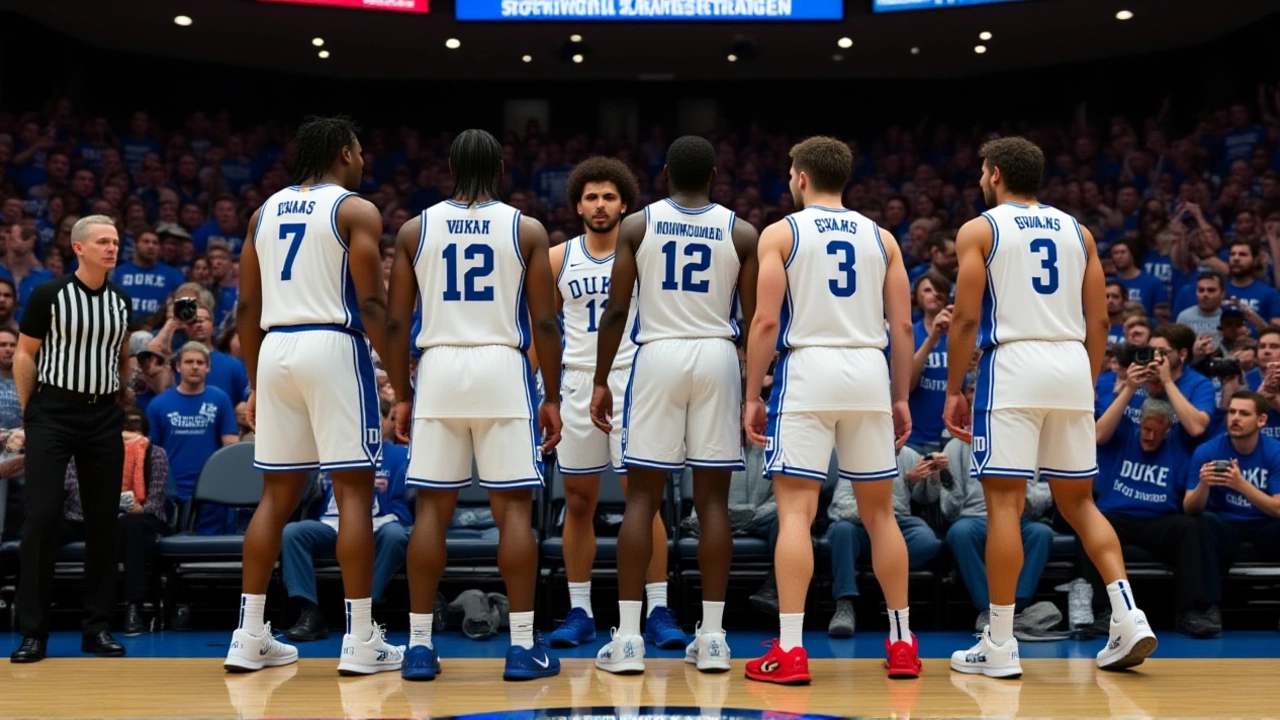The Duke Blue Devils didn’t just win—they survived. On Tuesday, November 18, 2025, at 8:31 PM Eastern Time, the No. 5-ranked Blue Devils held off a gritty Kansas Jayhawks team 78-66 in the State Farm Champions Classic at Madison Square Garden in New York City. It wasn’t pretty. It wasn’t clean. But it was real. And for Duke, that’s enough.
Defensive Grit Over Flashy Offense
Duke didn’t win because they shot lights out. They won because they refused to let Kansas get second chances. The Blue Devils grabbed 32 defensive rebounds—11 more than Kansas—and turned those into 22 second-chance points. That’s the kind of stat that doesn’t show up on highlight reels, but it wins games in January. Coach Jon Scheyer said it plainly after the game: “I thought the key was, you know, our defensive rebounding.”
It wasn’t just about size. It was about urgency. Freshman Cayden Boozer and sophomore Patrick Ngongba both finished with double-digit rebounds, and neither is taller than 6’7”. They didn’t outjump Kansas—they outworked them. And when Kansas’s guards drove into the lane, Duke’s help defense was always there, collapsing like a trapdoor.
Kansas Without Peterson: A Team in Transition
But here’s the twist: Kansas didn’t have its best player. Darryn Peterson, the Jayhawks’ dynamic 6’4” guard and primary playmaker, was sidelined with an undisclosed injury. Coach Bill Self had warned reporters after Kansas’s win over Princeton that Peterson would be out “for the immediate future.” Without him, Kansas’s offense sputtered. Their assist-to-turnover ratio dropped to 1.1—well below their season average of 2.3. Tre White, normally a complementary scorer, was forced into a lead role and went 4-for-16 from the field.
“We knew he was gone,” said one Kansas assistant coach after the game, speaking anonymously. “But you don’t prepare for that. You prepare for the team you’ve got. Not the team you wish you had.”
MSG: The Stage That Demands Grit
Madison Square Garden isn’t just a venue. It’s an experience. The crowd, the noise, the history—it all weighs on you. Scheyer knew it. That’s why he scheduled physical exhibition games against University of Tennessee and a tough opener against University of Texas. “You know, it’s the reason we played Tennessee,” he said during the Carolina Blitz interview. “You need to feel that kind of physicality before you walk into MSG.”
And it showed. Duke’s bench didn’t panic when Kansas cut the lead to four with 8:30 left. They didn’t try to force threes. They kept passing, kept moving, kept rebounding. And when Scheyer called for a timeout with 2:17 left, he didn’t draw up a fancy play. He just said: “Get the ball to the bigs. Get it to the glass. And don’t let them breathe.”
The Cam Factor: A Quiet Catalyst
One name kept popping up in Scheyer’s post-game comments: “Cam.” No last name. No jersey number. Just “Cam.” Rumors point to Cam Spencer, Duke’s junior guard who quietly posted 14 points, 5 assists, and 3 steals. Scheyer asked him during the interview: “What was it like playing here? What did you figure out in the second half?”
Spencer, who transferred from Loyola Chicago last year, has been the team’s emotional anchor. He didn’t score in bunches, but he made the right pass every time. He drew two charges. He hit a step-back jumper with 1:12 left that put Duke up 74-64—the dagger. “He just knew,” Scheyer said. “I don’t know if I knew, but he definitely knew.”

What This Means for the Season
Duke improves to 4-0, still ranked No. 5. They’ve now beaten three top-50 teams in their first four games, including two on the road. Their defense, which allowed just 66 points to a Kansas team that averages 79, is trending toward elite status.
Kansas, meanwhile, falls to 2-1. Without Peterson, their ceiling feels lower. But Self isn’t panicking. “We’re not broken,” he said after the game. “We’re just learning how to play without our heartbeat.”
The NCAA’s official post-event analysis noted: “The 2025 Champions Classic did not wow with tight games, but there were unmistakable messages sent.” One message? Duke is a title contender. Another? Kansas is a team in flux. And a third? Madison Square Garden still owns college basketball’s biggest nights.
What’s Next?
Duke heads to North Carolina next week for a showdown with the Tar Heels—another rivalry that could define their season. Kansas returns home to Lawrence, where Peterson’s return date remains uncertain. If he’s out past December, the Jayhawks’ NCAA tournament hopes could hinge on how quickly their young guards adapt.
And as for the Champions Classic? It’s not just a showcase. It’s a stress test. And on November 18, Duke passed with flying colors.
Frequently Asked Questions
How did Duke’s defensive rebounding impact the game’s outcome?
Duke grabbed 32 defensive rebounds—11 more than Kansas—which led to 22 second-chance points. That margin turned what could’ve been a close game into a 12-point win. Kansas, missing their primary ball-handler Darryn Peterson, struggled to generate clean looks, making every missed shot more costly. Duke’s hustle on the glass neutralized Kansas’s size advantage.
Why was Darryn Peterson’s absence so critical for Kansas?
Peterson, Kansas’s leading scorer and primary playmaker, averaged 16.8 points and 5.2 assists per game before his injury. Without him, the Jayhawks’ offense became predictable, with Tre White forced into a high-usage role he wasn’t prepared for. Kansas’s assist-to-turnover ratio dropped from 2.3 to 1.1, and their field goal percentage fell to 41%—their lowest of the season.
What role did Madison Square Garden play in Duke’s performance?
MSG’s intensity can rattle even seasoned teams. Duke prepared by playing two physically demanding early-season games—against Tennessee and Texas—to simulate the pressure. Coach Jon Scheyer credited that prep for helping his team stay composed. Cam Spencer, in particular, thrived in the environment, making key plays down the stretch that only experience in high-stakes venues can teach.
Who is ‘Cam’ that Coach Scheyer kept referencing?
‘Cam’ is Cam Spencer, Duke’s junior guard and transfer from Loyola Chicago. He scored 14 points, dished out 5 assists, and recorded 3 steals without a turnover. More importantly, he made the right reads under pressure—hitting a clutch step-back jumper with 1:12 left to seal the win. Scheyer called him the team’s emotional anchor, someone who ‘knew’ the moment without being told.
How does this win affect Duke’s national title chances?
Duke’s victory over a ranked, albeit shorthanded, Kansas team on a national stage boosts their resume significantly. With a top-5 ranking and wins over four top-50 opponents in four games, they’re now in the conversation for a No. 1 seed. Their defense is elite, and their depth is tested. If they keep rebounding like this, they’re a serious threat in March.
What’s the significance of the State Farm Champions Classic?
The State Farm Champions Classic, held annually at Madison Square Garden, pits four of college basketball’s blue-blood programs against each other. This year’s field included Duke, Kansas, Michigan, and Kentucky. While not a tournament, it’s a barometer for early-season strength. Duke’s win here—especially without their star freshman being dominant—signals maturity. It’s not about who scores the most. It’s who survives the pressure.

Write a comment